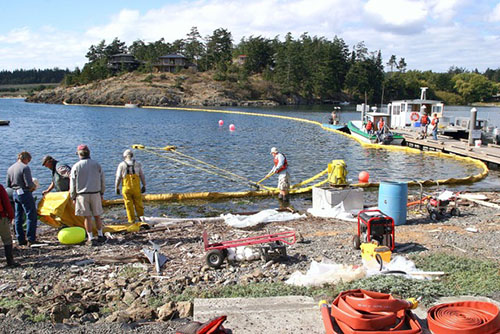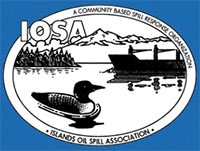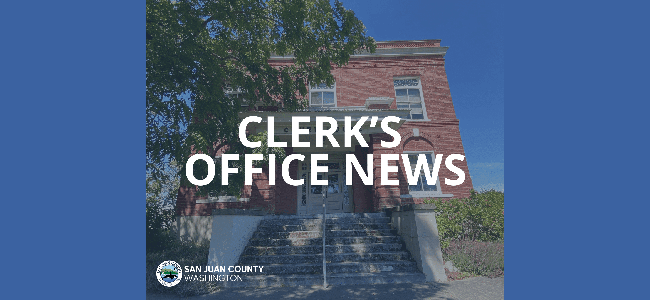— by Deborah Sparks, Orcas Issues reporter —

The Islands Oil Spill Association (IOSA) held a meeting of volunteer Action Team Members, who give their time to responding to emergency oil spills in the waters in the San Juan Islands. The meeting was held at the Eastsound Firehall on February 27 lead by Action Team Coordinator, Brendan Cowan.
Cowan, the IOSA Board of Directors and Public Information Officer, along with Orcas Island resident, Ken Carrasco are currently working on restructuring IOSA to organize, update, and create a community-based oil response organization that will meet current requirements and needs of the county. Part of this effort is to reinforce communication between all factions of IOSA (which includes action teams) by holding a series of meetings to listen to and acknowledge what each area of IOSA is contributing. Their goal is to expand and build a more efficient response network. Many of the volunteers at the meeting have been a part of the IOSA’s Volunteer Response Team for many years, so this fresh overview of IOSA is seen as a welcome necessity and up-grade of the services they provide.
In attendance at this meeting were about 22 people representing IOSA Action Team members from Orcas, San Juan Island, and Lopez Island although IOSA will again be responding to all parts of our waters. There was definitely a camaraderie among the men and women there and an enthusiastic interest in what would be discussed at the meeting. An expert trainer in oil spill response, Brian Johnson, from DH Environmental Inc. in Seattle, spoke on the various team training hours needed to be fully educated in hazardous oil spill safety, containment, and environmental protections. Each team member is advised to have physicals to make sure working in a ‘hands on’ capacity would be safe due to the poisons teams could be exposed to. The training is complex and calls for dedication and commitment from team members, but fortunately, Training Branch Director, Jerry McElyea, is a resident, experienced Response Team Trainer and, along with Cowan, can answer any questions an Action Team Member may have.
IOSA, having been granted the status of a Primary Response Contractor (PRC) by the Washington State Department of Ecology, has been responding to hazardous oil spills for 30 years. Team member, Randall Waugh, said there have been at least 150 responses over the years, in the waters around the islands.
However, in November of 2018, IOSA had to give up their PRC status, so this has given IOSA time to re-group, re-educate and re-organize all areas of the organization, reinstating IOSA by summer or fall of 2019. IOSA is addressing sustainable funding to supplement the grants received from San Juan county Community Foundations, and the oil industry. More funding will help to implement their organizational plans of offering the county the best possible services. Once in operation again, IOSA’s responsibilities will include:
- Oil spill assessment
- Air monitoring
- Site safety assessment
- Oil spill containment
- Oil spill clean up
- Possibly assistance with wildlife including oiled bird rescue and initial care.
The public is warned that spills should be reported and assessed as it is a poison and could be dangerous through contact or in the air. Any oil spills, or oil on or near the water, or on birds can be reported by calling the National Response Center: 1-800-424-8802.
Everyone in the San Juan Islands — residents and tourists — need knowledge of the Island Oil Spill Association, so that we can all help in protecting our environment, wildlife, and each other in case of this kind of disaster.
Those interested in getting involved and supporting IOSA are encouraged to watch for an upcoming announcement about a series of community meetings on Orcas, San Juan, and Lopez in April. Those meetings will be an opportunity to learn more, sign up as a potential volunteer and ask questions about IOSA’s effort to protect the islands.
Go to the IOSA website: iosaonline.org and read how you could help by becoming a volunteer and to learn more about IOSA and the different agencies that work in oil spill response.
**If you are reading theOrcasonian for free, thank your fellow islanders. If you would like to support theOrcasonian CLICK HERE to set your modestly-priced, voluntary subscription. Otherwise, no worries; we’re happy to share with you.**








Heartfelt thanks to these heroic volunteers, who try their best to protect our waters using limited resources. We need to find better ways to provide them sustainable funding needed to continue their essential work.